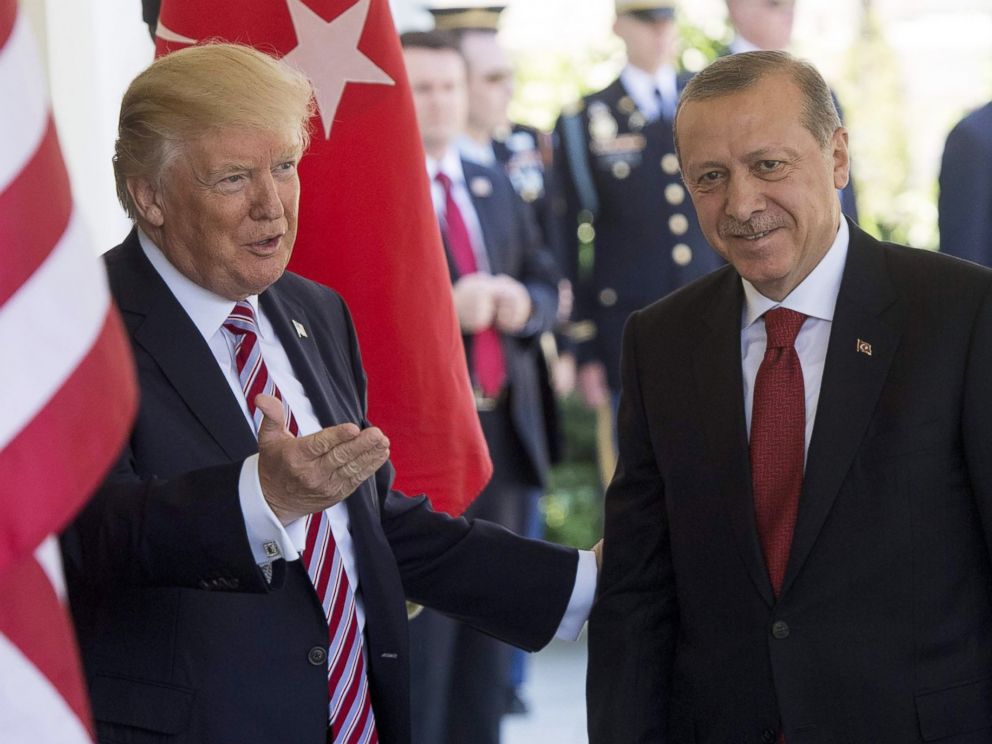Despite sharp differences, Trump and Erdogan clasp hands after cozy meeting
The pair made little progress to deal with their differences on Syria, terror.
— -- President Donald Trump and Turkish President Recep Tayyip Erdogan showered each other with praise after a series of meetings at the White House Tuesday, but they made little progress to deal with their sharp differences on issues like terrorism and Syria.
According to a readout provided by the White House Tuesday night, the leaders discussed "how to further strengthen the deep and diverse relationship between our two countries. President Trump reiterated the commitment of the United States to the security of our NATO ally Turkey and the need to work together to confront terrorism in all its forms."
They promised renewed economic ties and lionized each other’s militaries for their efforts against ISIS. But underneath the talk of “a new era,” a deep fissure remains over the Trump administration’s decision to directly arm a Kurdish rebel group in Syria that Turkey labels a terrorist organization.
Seen as the most effective group in the fight against ISIS, the YPG is part of the broader Syrian Democratic Forces, a multi-ethnic force that is backed by the U.S. and its coalition. The Pentagon is now selling the YPG weapons like heavy machine guns, mortars and armored vehicles as it advances on ISIS’ self-declared capital of Raqqa.
Erdogan again raised his country’s vehement opposition.
“We are committed to fighting all forms of terrorism, without any discrimination whatsoever, that impose a clear and a present threat upon our future,” he said next to Trump, a clear reference to not just ISIS, but Kurdish revolutionary groups like the YPG and its political wing PYD, as well as the PKK in Turkey. The U.S. and the European Union agree with Turkey that the PKK is a terrorist organization.
“Taking YPG and PYD into consideration in the region will never be accepted, and it is going to be against a global agreement that we have reached,” he warned.
While Trump explicitly called out the PKK and promised they would have “no safe quarter,” there has been no indication from the White House that the U.S. will withdraw support for the YPG.

Papering over the tension, the two men instead offered effusive praise for each other and the U.S.-Turkish relationship. Erdogan congratulated Trump for his “legendary triumph” in the November presidential election, called him his “dear friend,” and welcomed a “historical turn of the tide” after their meeting.
“President Trump's recent election victory has led to the awakening of a new set of aspirations and expectations and hopes in our region,” he said. “I hope and pray that both of us will be committed to extending further our cooperation in the future, along with consulting each other more frequently.”
The Oval Office meeting was an honor returned to Erdogan, who was not given such a welcome in the later years of the Obama administration. After once praising him as a reformer, Obama began to sour on the prime minister turned president after he began consolidating power, cracking down on public protests, and jailing any political opposition and journalists.
Trump, for his part, made no mention of those issues, instead reminiscing about the history of American-Turkish alliance and thanking Erdogan for his visit. Trump was one of the few world leaders to call Erdogan and congratulate him last month after he tightened his reigns even further in a national referendum. Observers and critics said the vote was rife with irregularities and threatened democracy in Turkey by weakening parliament and eliminating the prime minister position.
“I look forward to working together with President Erdogan on achieving peace and security in the Middle East, on confronting the shared threats, and on working toward a future of dignity and safety for all of our people,” he said.
Lingering behind all this is another source of tension that Trump didn’t even mention: The case of Fethullah Gulen. The Turkish cleric and political figure is in exile in Pennsylvania, and Erdogan blames him for a failed military coup last summer and a host of other domestic problems. The Turkish government wants him extradited to face charges in Turkey -- and Erdogan brought it up again.
“I have been very frankly communicating our expectations with regard to the centralized terrorist organization,” he said, bashing Gulen’s followers, known as the Gulenist movement.
The Trump team was once reportedly considering kidnapping Gulen and sending him back, but it is not clear what their policy is now.
Trump also raised the issue of Andrew Brunson, an American pastor that the U.S. has been pressing to be released. The White House readout said the president discussed "the incarceration of Pastor Andrew Brunson and asked that the Turkish Government expeditiously return him to the United States."




